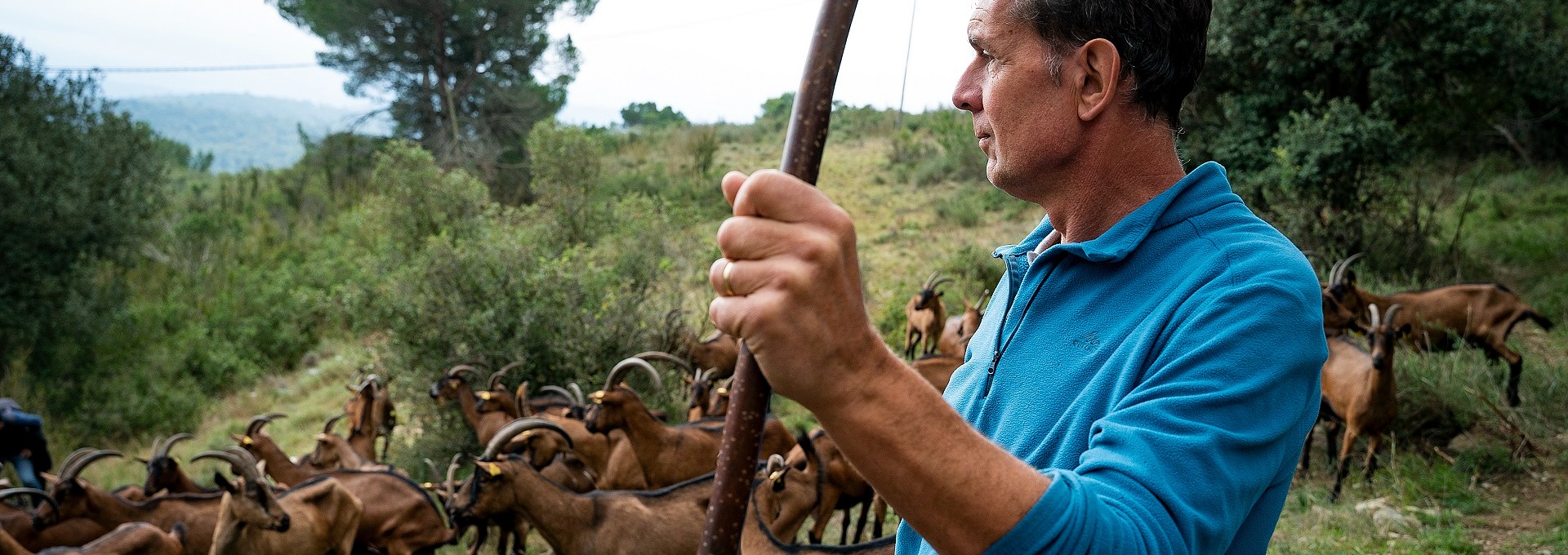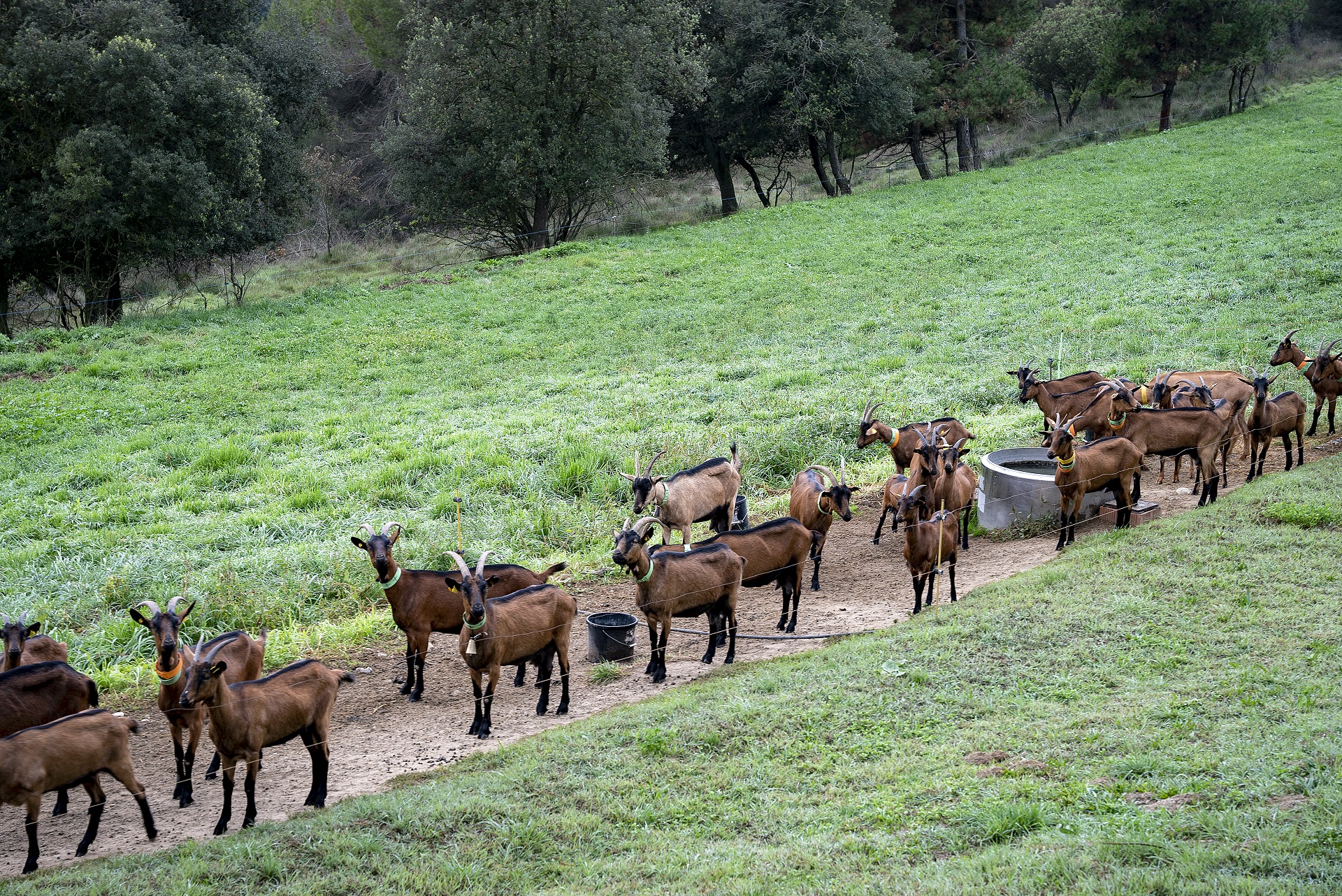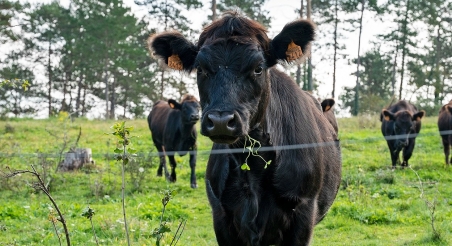Francesc Molins was born in Lliçà d'Amunt in 1966 and is the proud owner of Alpines Les Feixes, a dairy goat farm located in Moià. Along with meat and milk from his herd, he crafts artisanal cheeses. But today we haven't met with him to talk about the delights that come from his workshop; rather, it's to accompany him as he grazes through the forest while we benefit from his wise and insightful conversation.
As a founding member and president of Som Pastura, an association of shepherds and shepherdesses in Moianès that has received guidance within the European project BCN Smart Rural, Franc has many interesting things to say about the importance of returning herds to the forest in extensive farming. And we want to hear them. We want him to explain the role his animals play in protecting the landscape, biodiversity and the quality of foods produced in the Barcelona province.
What is Som Pastura and why was the association born? Was it out of necessity, opportunity or fatigue?
Som Pastura is an association of livestock farmers in Moianès that was born at the beginning of last year to preserve the primary sector in the territory. We are concerned about the lack of basic infrastructure for the proper functioning of our activities, such as low-capacity abattoirs or shared food processing facilities. There is also a lack of generational renewal that needs to be addressed. We know that livestock farming helps in forest conservation, and we thought that if we came together, we could increase our visibility in advocating for the values we share. It is the primary sector that feeds everyone and we want to be acknowledged a little more.
«The primary sector is what feeds everyone» Francesc Molins
What are the benefits of belonging to an association like yours for pasture farmers? What can be accomplished as a group that cannot be achieved individually?
Logically, being united helps us to be stronger and we can achieve more things than alone. But the benefits of belonging to a group go beyond lobbying: it also allows us to share infrastructures necessary to carry out our activity and gives us an excuse to meet. We are all connoisseurs of the territory and it is good for us to talk, for example, about where we can move around or who is retiring and does not have generational renewal. By participating in the association's meetings, we can find out in advance who wants to retire and work together to find someone to stay in place and not have to close the business.
Why is grazing important? What benefits do animals grazing the woods bring to society?
Grazing, whether in forests or pastures, provides us with everything we need. Firstly, the livestock that roam in the forests benefit from the environment which results in better quality products for us. In addition, herds play a crucial role in keeping the undergrowth under control. While machinery is often used for forest management, animals offer a more sustainable and effective solution for forest conservation. When people blame animals for destroying the forest, I always explain that this would only happen if livestock farmers and shepherds didn't control them and allowed overgrazing. However, we have a good understanding of the land and know where and when our animals should graze to prevent the excessive growth of bushes and weeds. You can visit our farms to witness the positive impact that our herds have on the land.
Do you think the impact of wildfires would be reduced if all forests were grazed by animals?
When it comes to preventing and extinguishing wildfires, it's important to take herds of grazing animals seriously. Having more animals grazing in an area makes it easier to access all corners of the territory, making fire prevention and extinguishing efforts more effective. Moreover, grazing animals help reduce the amount of fuel biomass that accumulates in vegetation, which in turn reduces the risk of large fires.
«When it comes to preventing and extinguishing wildfires, it's important to take herds of grazing animals seriously» Francesc Molins
The grazing culture in Catalonia, how is it doing? How has it evolved in recent years?
When discussing livestock farming on a large scale, it is generally acknowledged that it is a growing industry. However, when we focus specifically on small ruminant farmers, the situation is different. These farmers often face issues with accessing land. As the population continues to grow, we find ourselves having to move to higher ground so that our herds can graze. However, there is now a growing awareness that our current food production system needs to change, and it's becoming clear that large super-intensive farms are not a sustainable option if we want to preserve our land. In this context, it would seem that the few livestock farmers and extensive shepherds we have left could manage to survive, but it's challenging.
Would you say that there should be an increase or decrease in the number of small pasture farmers like yourself?
We should have many more herd farmers in Catalonia. This would help us achieve food sovereignty and reduce our dependence on imported products. Many fields in the territory are currently abandoned, and if we put them to use, we could produce enough food to meet our needs without having to bring in products from outside.
«We should have many more herd farmers in Catalonia» Francesc Molins
What are the requirements for the small livestock industry to expand in the coming years?
In the livestock industry, we lack the infrastructure that once existed, such as small shared food processing facilities and low-capacity abattoirs. Today, we have to travel between sixty and one hundred and twenty kilometres to be able to sacrifice our animals to private industries that offer us their services under unviable conditions. If we want to attract young people to the sector, we need to improve access to land and increase the amount of infrastructure available.
The lack of generational renewal is one of the main challenges for pastoralists. How can the shortage of young shepherds be reversed?
To begin with, individuals who wish to start a small herd need to have access to land, as without it, the herd cannot be sustained. Furthermore, a shift in mindset is required, wherein young people need to understand that economic viability is not something that can be achieved overnight. Starting a business takes a few years and is not an easy task by any means. However, if they seek advice and work out their numbers, they can improve their chances of success. To continue, livestock farmers of a certain age should have the option to say «I don't close: I retire. And I want to pass on my business to someone». To facilitate generational renewal, the government should also simplify bureaucratic procedures and provide ample assistance to people.
What is the current weight of women in pasture farming?
In recent years, the role of women has significantly changed. Nowadays, many women own their herds, work as shepherds, or run workshops. In our case, my partner Núria participates in all the tasks that I do. We share equal roles, and we always support each other.
Would you say that your work and products are valued enough by society?
Although progress has been made, there is still a long way to go when it comes to making informed decisions about the food we consume. While more people are becoming aware of the importance of buying local products, it's crucial to understand that consuming a cut of lamb, a slice of cheese or a glass of local milk contributes to the livelihood of the people in the area and is more sustainable from an environmental perspective.
«People needs to understand that consuming a cut of lamb, a slice of cheese or a glass of local milk contributes to the livelihood of the people in the area and is more sustainable from an environmental perspective» Francesc Molins
Does the economic viability of your business rely on consumers being willing to pay a fair price for a higher-quality product?
Small local producers face a significant challenge in making customers realize that the food they produce is not expensive. The perception of high prices is often due to the fact that customers are used to buying food very cheaply in supermarkets. However, supermarkets achieve these prices by cutting back little by little throughout the primary sector. As a result, farmers who grow vegetables, have fruit trees, and produce milk or meat are forced to sell their raw materials at prices far below what is reasonable. On the other hand, the prices we set are not exorbitant, but reasonable. They are the ones that enable us to sustain our business and keep it running. Furthermore, local products generate very little CO2 emissions as they don't have to travel thousands of kilometres. These factors should be taken into consideration.
«Living in the rural world is like living in paradise» Francesc Molins
Finally, what would you say are the main advantages of living and working in the rural world? Do you think it's great luck or are you weighed down by the shortcomings?
We do have some shortcomings, but for my partner, our children, and me, living in the rural world is like living in paradise. We enjoy many freedoms that we wouldn't have if we lived in the city. Apart from breathing cleaner and healthier air, we don't have to deal with noise pollution and we don't need many things to be happy. I feel sad when I see children spending five or six hours in front of a screen. They should be outside playing, digging, using a hammer and learning to live.
— BCN Smart Rural Editorial —




